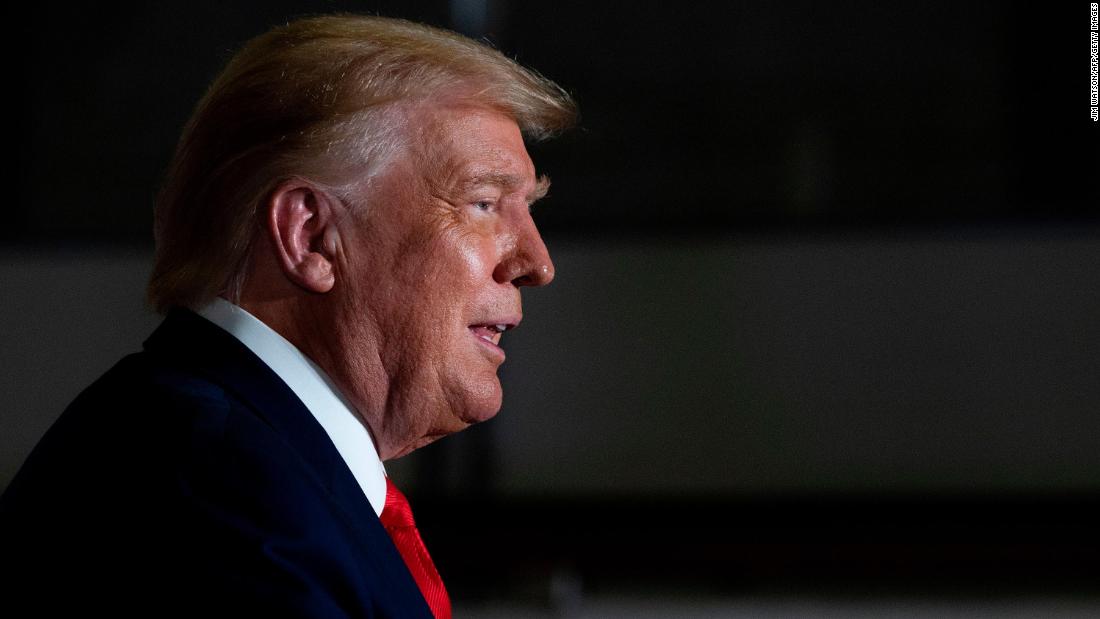
This relationship was on display on Monday, when the rapper 50 Cent said to "vote for Trump" in response to Democratic nominee Joe Biden's tax plan.
At the Republican National Convention in August, speakers including the former NFL star Herschel Walker and South Carolina Sen. Tim Scott lacquered Trump with praise.
With the 2020 presidential election coming down to the wire, it's clear that Team Trump is hoping to maximize its appeal with Black voters. During the final debate on Thursday, NBC's Kristen Welker asked Trump and Biden if they understand why Black parents have to give their children "the talk" about how to handle encounters with the police. The President said yes -- before he quickly moved on and claimed to be "the least racist person in the room," a response that was at odds with his track record and failed to reflect if he truly understands anything about the Black experience.
Just last month, the Trump campaign announced a thinly detailed "Platinum Plan," which extends a promise of Black economic development.
At first glance, such maneuvering is puzzling. The President is decidedly unpopular with the Black electorate: In September, Gallup reported that Trump's job approval rating among Black Americans hovers at 11%. According to a January Washington Post/Ipsos poll, more than 8-in-10 black Americans believe that Trump is a racist.
On Friday, California Sen. Kamala Harris, the Democratic vice presidential nominee, knocked the President for his efforts.
"Donald Trump has this goal to turn 20% of Black men out in favor of him. Donald Trump who pushed, as part of his popularity, the theme that the first Black man to be President of the United States was illegitimately there," she said.
But the Trump campaign isn't without a strategy.
According to Theodore Johnson, a senior fellow at the Brennan Center for Justice, where he studies the role of race in electoral politics, figures such as Walker and 50 Cent share a few meaningful characteristics.
"If you're a Republican presidential candidate, you recognize that most Black people aren't going to vote for you. But the most likely segment of Black people to vote for you is Black men, and a particular sort of Black man," Johnson told CNN. "It wasn't surprising that after Trump became the President-elect, a parade of Black men -- celebrities and athletes including Steve Harvey, Ray Lewis and Kanye West -- went into Trump Tower. If you're a Black man and a celebrity or an athlete, that usually means that the money you have is new and that you grew up either poor or working class."
Johnson believes that there's something about this brew of economic security, hypermasculinity and bootstrap self-determination -- "he has accomplished so much almost all by himself," Walker says of the President in a spot airing on Black radio stations -- that can make Trump resonate with some Black men.
In 2016, 13% of Black men who voted cast their ballots for Trump. For Black women, this figure was a meager 4%. (Notably, men of every race supported Trump more than the women of that race did.)
Consider Trump's complicated presence in hip-hop, stretching back to the 1980s. While in recent years the President has become a target on tracks, previously, he was something of an avatar of wealth, a name that Black male rappers dropped to boast about their fortunes.
"From broke to having brokers, my price range is Rover / Now I'm knocking like Jehovah, let me in now, let me in now," Nelly says on his 2000 song "Country Grammar." "Bill Gates, Donald Trump, let me in now."
Far from being a scrub, Nelly on the track is a pioneer, barging into the White boys' club of the ultra-rich and famous.
It's important to underscore that, in all likelihood, Trump will win no more than about 15% of votes from Black men, because most will back Biden. Indeed, when it comes to loyalty to the Democratic Party, Black men are second only to Black women.
Still, as the political scientist Melanye Price wrote last week over at The Grio, that the Trump campaign is attempting to capture Black male support at all speaks to how "close victories are never about majorities, but the potential of small groups in important states to shape national results."
Price added that "the power of this siphoning strategy is surgical. In the wake of grave concerns about voter suppression, fears about mail-in ballots and the continued impact of the pandemic, close political races are increasingly less predictable."
This unsettling reality, made worse by a wider push for voter depression aimed at Black Americans, is partly why the Biden campaign has beefed up its outreach efforts. Earlier this year, the former vice president's team launched its "Shop Talk" series, roundtables that focus on mining the issues affecting Black communities, especially Black men.
While seemingly small, the series might be just the kind of venue the Biden campaign needs to animate a crucial constituency and blunt its opponent's reelection efforts.
"If you know that man who likes Trump's machismo and supposed business acumen, ask him: Do you know anyone who's died from Covid-19? If he's in an urban area, he's probably going to answer yes," Johnson told CNN. "Ask him: Do you know anyone who's lost their job because of Covid-19? He's probably going to answer yes. What you do is contrast the perception of Trump with the reality of his governance and say that the best thing you can do for your life is to put new leadership in place."
"many" - Google News
October 24, 2020 at 03:58AM
https://ift.tt/3dRaSf3
Trump's 'least racist' claim falls flat for many. Yet his campaign still holds appeal for some Black men. - CNN
"many" - Google News
https://ift.tt/2OYUfnl
https://ift.tt/3f9EULr
No comments:
Post a Comment